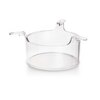MABN2423-100UG Sigma-AldrichAnti-THIK-2 Antibody, clone N468/37
Anti-THIK-2, clone N468/37, Cat. No. MABN2423, is a mouse monoclonal antibody that detects Potassium channel, subfamily K, member 12 (THIK-2) and is tested for use in Immunohistochemistry (Paraffin).
More>> Anti-THIK-2, clone N468/37, Cat. No. MABN2423, is a mouse monoclonal antibody that detects Potassium channel, subfamily K, member 12 (THIK-2) and is tested for use in Immunohistochemistry (Paraffin). Less<<Recommended Products
Overview
| Replacement Information |
|---|
| References |
|---|
| Product Information | |
|---|---|
| Format | Purified |
| Presentation | Purified mouse monoclonal antibody IgG1 in buffer containing 0.1 M Tris-Glycine (pH 7.4), 150 mM NaCl with 0.05% sodium azide. |
| Quality Level | MQ200 |
| Physicochemical Information |
|---|
| Dimensions |
|---|
| Materials Information |
|---|
| Toxicological Information |
|---|
| Safety Information according to GHS |
|---|
| Safety Information |
|---|
| Storage and Shipping Information | |
|---|---|
| Storage Conditions | Stable for 1 year at +2°C to +8°C from date of receipt. |
| Packaging Information | |
|---|---|
| Material Size | 100 μg |
| Transport Information |
|---|
| Supplemental Information |
|---|
| Specifications |
|---|
| Global Trade Item Number | |
|---|---|
| Catalogue Number | GTIN |
| MABN2423-100UG | 04061842667703 |
Documentation
Anti-THIK-2 Antibody, clone N468/37 SDS
| Title |
|---|
Anti-THIK-2 Antibody, clone N468/37 Certificates of Analysis
| Title | Lot Number |
|---|---|
| Anti-THIK-2, clone N468/37 - Q3509834 | Q3509834 |
















